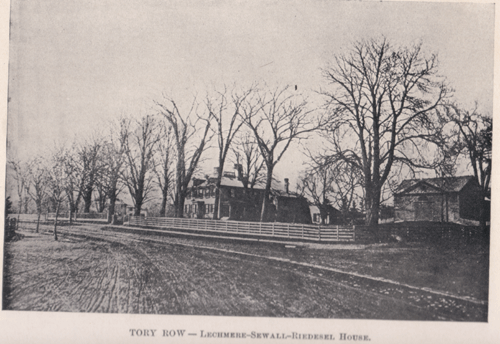Sewall had two young sons. Her husband, attorney general Jonathan Sewall, had gone into Boston that morning. The household also included a couple of law students about twenty years old and at least one enslaved man.
Outside, there were upwards of forty local men and boys demanding that her husband come out and answer for the royal governor’s actions. Not only was Gen. Thomas Gage implementing the Massachusetts Government Act, but he had just taken gunpowder and cannon away from the local militia.
Yesterday I started quoting an account of that confrontation from a third, unnamed young man inside the house. It continued:
…those without played their artillery of stones & brickbats against the windows.It was still possible for young men to stop their violence before anyone was hurt. As long as there was wine involved.
The door being shut, & they being enraged by the explosion of a gun in the entry near the front window tho’ without the least design of hurting & at a different side of the house from where we supposed the mob were, they went into the front yard & broke those windows.
We then went out to them & declared that the gun went off accidentally, that we were very sorry for it as it was agreed upon since we had got them out of the house not to fire but on the last extremity; yet that we were determined to defend ourselves at the risque of our lives & they might depend upon resistance at all events if they offered to reenter. We begged them to consider the distress this might occasion to Mrs Sewall & family & to disperse
They appeared to be satisfied about the gun at last, told us we had fought like brave fellows & if we would give them something to drink they would not go to Judge [Joseph] Lee’s as they intended but would disperse
which they did after drinking a few glasses of wine & cordially bid each other Good-Night.
Years later, in speaking to the Loyalists Commission, one of the law students, Ward Chipman, declared that he had deliberately fired that pistol. He went on to be one of the most important builders of New Brunswick, Canada.
Massachusetts Patriots seized on Chipman’s gunshot and spun events to suggest that it provoked the crowd’s violence. For example, Dr. Joseph Warren wrote to Samuel Adams on 4 September: “some boys and negroes had called at Mr. Sewall’s house at Cambridge; and, by the imprudent discharge of a pistol by a person in the house, they were provoked to break the windows, but very soon left the house without doing further damage.”
Even Esther Sewall’s own father, Edmund Quincy, unhelpfully told her sister: “Im sorry to understand, that thro. great inadvertency, a Gun or pistol was dischd. from ye. house—ye sole Cause of ye Violence wch. ensued.”
By the end of 2 September, however, almost no one was talking about the assault on the attorney general’s house. Sparked by wildly exaggerated rumors of a British military attack, thousands of Massachusetts militiamen had marched into Cambridge and forced resignations from everyone from the county clerk to the lieutenant governor. That “Powder Alarm” signaled the end of royal rule in almost all of New England. The conflict in Massachusetts turned from political to military.
The Sewall house still stands on Brattle Street in Cambridge, though moved from its original site. It’s in private hands and unmarked.
As far as I can tell, the anonymous account of what happened there in September 1774 has been published only in Leslie F. S. Upton’s 1968 collection of readings, Revolutionary Versus Loyalist: The First American Civil War, 1774-1784.

Thanks for sharing this. Jonathan Sewall was my greatX4 grandfather. All I had on this incident was that "The Sewall family home in Cambridge, Massachusetts was wrecked by a revolutionary mob, consisting of some fifty men and boys, on September 1, 1774. Jonathan was in Boston at the time, and a very frightened Esther Sewall struck a bargain with the mob of “patriots”. She exchanged the contents of her husband’s wine cellar for the mob’s dispersal."
ReplyDeletehttp://www.robertsewell.ca/sewell.html#gen7